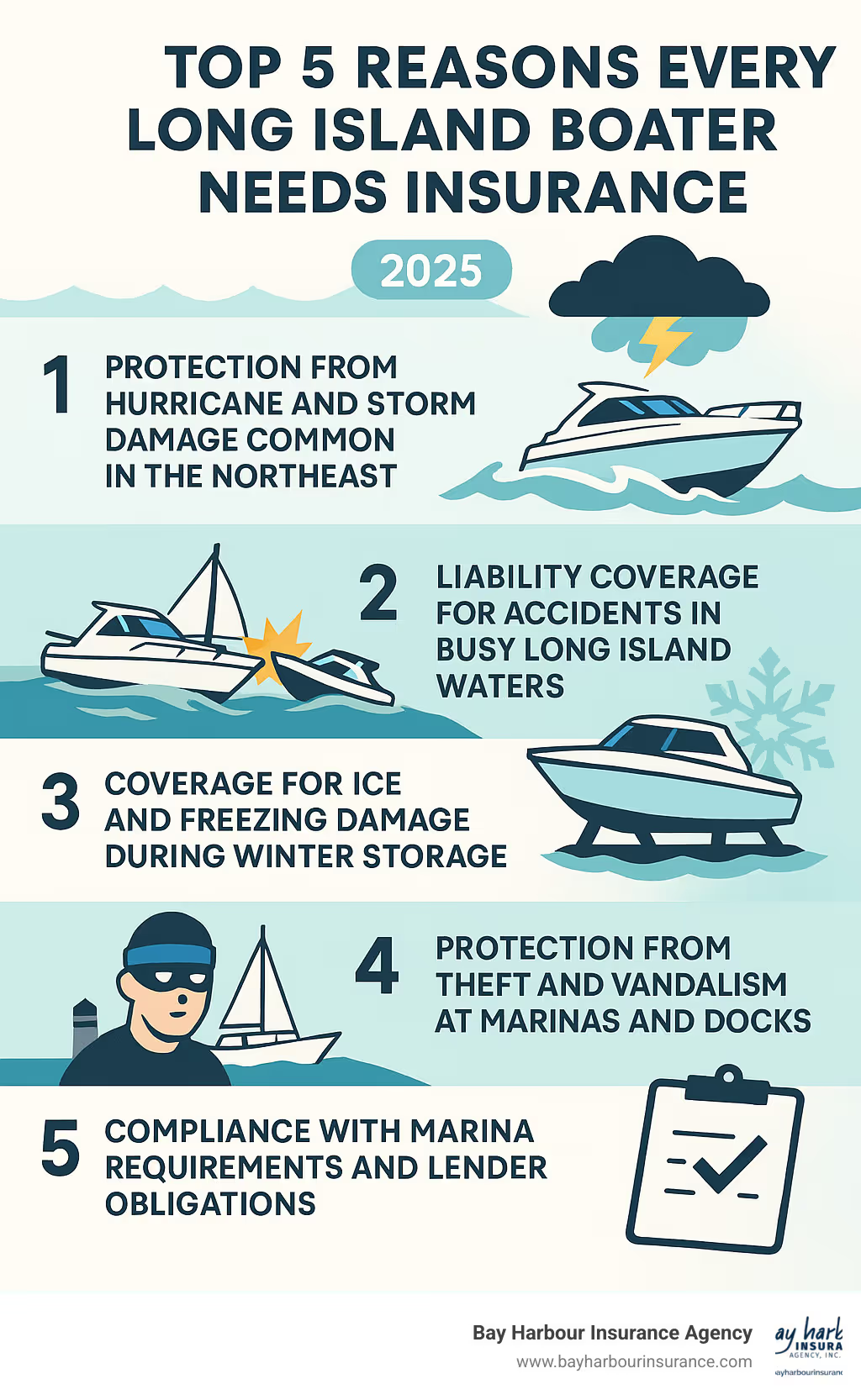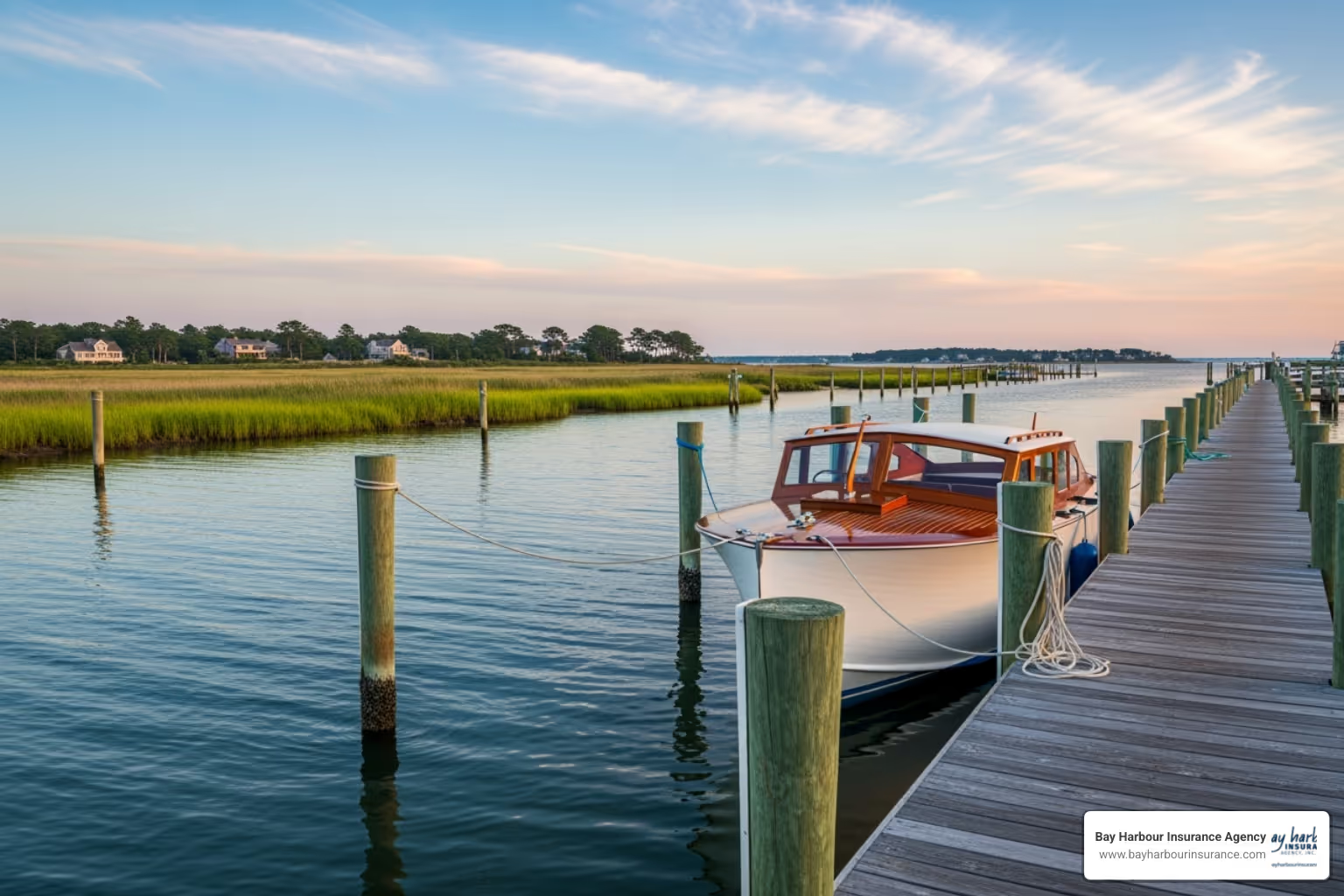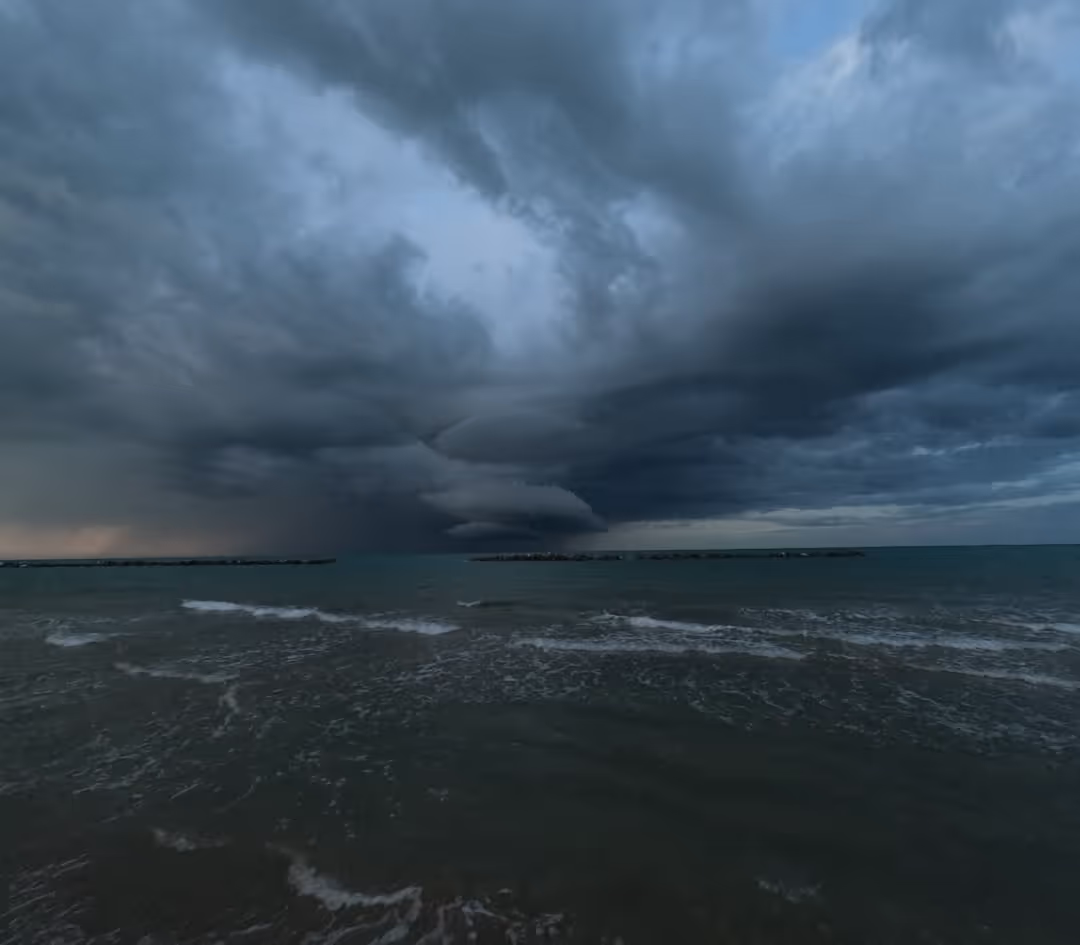
Long Island Boat Insurance: Where to Find Your Perfect Policy
August 15, 2025
Why Every Long Island Boater Needs the Right Insurance Coverage
Boat insurance Long Island residents need isn't just another expense—it's essential protection for your investment and peace of mind on the water. Whether you're cruising the Great South Bay, fishing off Montauk, or sailing the Long Island Sound, the right coverage protects you from unexpected costs that could reach tens of thousands of dollars.
Finding the right provider is key. While some agents represent only one company, an independent agency can shop multiple carriers to find the best policy for your specific needs. This is crucial because Long Island's unique boating environment creates specific risks. Hurricanes and nor'easters can cause major damage, while ice and freezing present winter storage challenges. The diverse waters—from protected bays to open ocean—mean your coverage needs depend heavily on where and how you boat.
New York doesn't require boat insurance by law, but most marinas do. More importantly, without coverage, you're personally liable for damage to other boats, docks, or injuries to passengers. A single accident could cost more than your boat is worth.
The good news? Boat insurance is relatively inexpensive compared to the protection it provides. Most Long Island boaters pay a fraction of their boat's value annually for comprehensive coverage that includes hull damage, liability protection, and specialized add-ons for local conditions.

Understanding Your Boat Insurance Policy
Getting the right boat insurance Long Island coverage starts with understanding what you're buying. Think of your policy as a toolkit, with each component handling a different problem to provide comprehensive protection on the water.
Your policy typically includes physical damage coverage for your vessel, liability protection if you accidentally hurt someone or damage their property, and medical payments for injuries on board. While New York doesn't require boat insurance by law, most marinas do, and if you have a loan on your boat, your lender will too.
The real question is what type of coverage makes the most sense for your boat. The difference between Agreed Value and Actual Cash Value coverage can mean thousands of dollars in your pocket if something goes wrong.
What's the Difference Between Boat and Yacht Insurance?
The answer is simpler than you might think. The magic number is 27 feet—that's generally where "boat" insurance becomes "yacht" insurance. But it's not just about size.
If you own a larger vessel, yacht insurance provides higher coverage limits, broader navigation areas, and specialized protection for things like crew liability and complex onboard systems. Yacht policies also offer more flexibility for longer trips and overnight stays in different ports.
The coverage is more specialized because the risks are different. A 35-foot yacht has different exposure than a 19-foot center console, and the insurance reflects that.
Core Coverage Components Explained
Every good boat insurance Long Island policy starts with these essential coverages:
Bodily Injury Liability is your financial shield if someone gets hurt in an accident you cause. This covers their medical bills, lost wages, and legal costs if they sue. On busy Long Island waters, this protection is critical.
Property Damage Liability handles damage your boat causes to someone else's property. Whether you accidentally hit another boat, a dock, or marina property, this coverage handles the repair bills.
Physical Damage (Hull) protection covers damage to your actual vessel. You'll choose between Agreed Value coverage, where you and the insurer agree on your boat's worth upfront, or Actual Cash Value coverage, which factors in depreciation but costs less in premiums.
Medical Payments coverage pays for immediate medical expenses if anyone gets injured on your boat, including you, regardless of who caused the accident.
Uninsured/Underinsured Watercraft coverage protects you when the other boater doesn't have enough insurance. Since not every boater carries adequate coverage, this fills a critical gap.
What Determines the Cost of Boat Insurance on Long Island?
Understanding what drives boat insurance Long Island costs helps you make smart decisions. Insurers assess everything about you, your boat, and how you use it to determine your premium.

Once you understand these factors, you can often influence some of them. Your boat's type and age matter significantly; a sleek powerboat typically costs more to insure than a sailboat because speed often equals higher risk. Older vessels may require an out-of-water survey before an insurer will offer coverage.
Value and horsepower have a direct relationship with your premium. The more your boat is worth or the more powerful its engine, the higher your rates tend to be.
Your personal history also plays a huge role. Boating experience is valuable to insurers; a captain with decades on the water gets better rates than a novice. Your driving record on land also matters, as insurers assume responsible drivers make responsible boaters. Your credit score can also influence rates, as it's often seen as an indicator of overall responsibility.
How Your Location and Storage Impact Rates
Long Island's unique geography and weather directly affect insurance costs. Where you keep your boat during the season makes a difference. A secure marina with professional staff looks much better to insurers than a private dock with minimal supervision.
Navigational limits in your policy determine where you can cruise. Some policies restrict you to protected waters like the Long Island Sound, while others allow ventures into the open ocean. Expanding your cruising grounds requires endorsements that increase your premium.
Long Island is in hurricane territory. Most carriers apply separate windstorm deductibles for named storms. Some policies even restrict navigation during peak hurricane season from June through November.
Winter brings its own challenges. Ice and freezing damage concerns insurers, but proper winterization helps. If you haul out your boat and have it professionally winterized, many insurers offer lay-up period discounts.
North Shore versus South Shore storage can also impact rates due to different storm exposures and marina security levels.
Common Boat Types and Their Insurance Considerations
Sailboat owners often get lower premiums since wind-powered vessels are generally considered less hazardous. However, a carbon fiber mast may have a separate, higher deductible. Some policies reward or require auxiliary motors.
Powerboats are the largest category, from small runabouts to large cruisers. Horsepower, top speed, and hull design all factor into your rates. If you enjoy waterskiing, check that it's not excluded from your coverage.
Fishing boats have different considerations. Recreational fishing is one thing, but running occasional charters requires specialized commercial coverage.
Personal watercraft like jet skis are typically insured at actual cash value rather than agreed value due to depreciation.
Catamarans can be tough to insure. Some carriers avoid them because if they flip, they can't be righted like traditional sailboats, leading to complex recovery situations.
Classic boats often need surveys to establish their condition and value. Well-maintained classics can often qualify for agreed value coverage that properly protects your investment.
Customizing Your Coverage for Long Island Waters
Long Island's waters offer diverse boating experiences but also present unique challenges. From peaceful afternoons in the Great South Bay to adventurous trips into the Atlantic, your boat insurance Long Island policy needs to be as versatile as your boating trips.

Living here means dealing with Mother Nature's mood swings. Hurricane season brings the potential for devastating storms, while nor'easters can pack an equally powerful punch. Winter conditions can also be damaging to boats that aren't properly protected from ice and freezing.
The good news is that you don't have to accept a one-size-fits-all policy. Customizing your coverage with the right add-ons and endorsements ensures you're protected against the specific risks of boating in our local waters.
Essential Add-Ons for the Avid Long Island Boater
Think of these add-ons as extra layers of protection. On-water towing and roadside assistance can be a lifesaver if your engine fails miles from shore. This service, often available as an add-on, provides professional towing so you're never truly stranded.
Trailer coverage is something many boaters overlook. It includes both physical damage protection and roadside assistance for your trailer.
Your personal effects and fishing equipment represent significant investments. Specialized coverage ensures these valuables are protected against theft or damage while on board.
Fuel spill liability is incredibly important. A small fuel spill can result in substantial environmental cleanup costs and fines. This coverage protects your wallet from these potentially devastating expenses.
Wreckage removal coverage is critical if your boat sinks or becomes a navigation hazard, as you could be legally required to remove it at a high cost.
For Long Island winters, ice and freezing coverage is essential. If your boat is professionally winterized, this coverage protects against damage from our harsh winter conditions. Lower deductibles on specific items like electronics can also reduce your out-of-pocket costs when filing claims.
Mechanical breakdown coverage can be valuable for older engines, protecting against mechanical failure. Supplemental family medical payments provides extra medical coverage beyond standard limits for additional peace of mind.
Are There Discounts for boat insurance on Long Island?
Who doesn't love saving money? There are several ways to reduce your boat insurance Long Island premium without sacrificing coverage.
Boating safety courses offer one of the best opportunities for savings. Completing a qualified course, such as one approved by the U.S. Coast Guard, shows insurers you're serious about safe boating, and they often reward that commitment with discounts. You can start with the BoatUS Foundation's free course: Take a Free Online Safety Course.
Multi-policy bundling is another smart way to save. Combining your boat insurance with other policies like home or auto often provides discounts across all your coverages.
Your clean driving record matters on the water, too. Insurers recognize that responsible drivers tend to be responsible boaters, so a good driving record can translate to savings.
Lay-up credits reward you for properly winterizing and storing your boat during the off-season. Since your boat faces fewer risks when stored out of the water, insurers offer credits for these periods.
Experience discounts recognize that seasoned boaters pose lower risks. The more years you've been boating safely, the more likely you are to qualify. Safety equipment credits may also be available for boats with advanced safety features like fire suppression systems.
Navigating the Quote and Claims Process
Getting boat insurance Long Island doesn't have to feel overwhelming. Think of it like planning a day on the water - with the right preparation and guidance, everything flows smoothly. We're here to walk you through both getting your quote and handling any claims that might come up down the road.

The insurance process has two main parts you'll encounter: getting your initial quote and potentially filing a claim someday. While we hope you never need to use that second part, knowing how both work gives you confidence on the water. Our team handles everything from your first questions about coverage to managing deductibles and making sure your policy fits your boating lifestyle perfectly.
Want to learn more about how we approach client service? Check out our About Our Personal & Business Insurance Agency page to see what makes us different.
How to Get a Quote for Boat Insurance on Long Island
Getting your boat insurance Long Island quote is straightforward when you know what information to have ready. We'll need to learn about you, your boating background, and your vessel to find the best coverage options.
Personal details are the starting point - your name, address, date of birth, and how to reach you. Then we'll ask about your boating experience. How long have you been on the water? Any accidents or violations in your past? If you've had incidents, we'll need specifics about dates and whether you were at fault. Don't worry - we're not judging, just making sure we get you accurate rates.
The vessel information is where things get interesting. We'll want your boat's year, make, model, and Hull Identification Number (HIN). What's it made of - fiberglass, wood, aluminum? What kind of engine setup do you have, and how much horsepower? We'll also ask about your boat's maximum speed and current value.
Where you keep your boat matters too. Is it at a marina, tied to a private dock, or stored on a trailer? Which waters do you typically steer - the Long Island Sound, Great South Bay, or do you venture offshore? How do you use your boat - just cruising around, serious fishing, water skiing with the family?
Finally, we'll discuss your coverage preferences. What liability limits make you comfortable? Do you want Agreed Value or Actual Cash Value for your hull coverage? What deductible feels right? Need trailer coverage or special additions like water ski medical coverage?
You can start with our online form for convenience, but honestly, a quick conversation with one of our agents often works better. We can explain options as we go and make sure you're getting exactly what you need.
What to Do When You Need to File a Claim
Nobody plans to file a claim, but knowing the steps ahead of time can turn a stressful situation into a manageable one.
Safety comes first, always. Take care of anyone who's injured and make sure your boat isn't creating more danger. If there are serious injuries, significant damage, or if the law requires it, contact the Coast Guard or local authorities right away.
Document everything you can. Take photos and videos of your boat's damage, any other property involved, and the overall scene. Get contact information from other boat operators and any witnesses. Your phone is your best friend here - capture as much detail as possible.
Call us or your insurance company as soon as it's safe to do so. We'll guide you through what happens next, explain how your coverage applies, and get your claim started. Don't admit fault to anyone at the scene - just stick to the facts about what happened.
Take reasonable steps to prevent further damage to your boat. This might mean some temporary repairs or moving to a safer spot. Keep receipts for any emergency expenses.
You'll need repair estimates eventually, and we can help connect you with trusted repair facilities. Our team works hard to handle your claim quickly and fairly, making sure you get back on the water as soon as possible.
The claims process might feel intimidating, but remember - this is exactly why you have insurance. We're here to make it as smooth as possible during what's already a challenging time.
Why Choose an Independent Agent for Your Policy?
When you're shopping for boat insurance Long Island, you'll quickly find you have two main paths: work with a captive agent who represents just one insurance company, or partner with an independent agent like our team at Bay Harbour Insurance Agency. We believe the choice is clear - and it's not just because we're independent agents ourselves!
The difference comes down to who we work for. A captive agent's loyalty lies with their single insurance company. They can only offer you what that one company provides, even if it's not the perfect fit for your needs. As an independent agency, we work for you. Our job is finding the best coverage at the right price, regardless of which company provides it.
This client-centered approach means we're not trying to fit you into a predetermined box. Instead, we're crafting a solution that matches your specific boating lifestyle on Long Island. Whether you're a weekend sailor in the Sound or a serious fisherman heading to Montauk, we take the time to understand what matters most to you.
Our deep roots in the Long Island community give us another advantage. Many of our team members are boaters themselves, navigating the same waters you do. We understand the unique challenges of boating here - from hurricane season preparations to finding the right winter storage solutions. This local knowledge translates into better advice and more appropriate coverage recommendations. You can learn more about our commitment to Personal & Business Insurance in the Community.
The Role of an Agent in Finding the Right Coverage
Think of us as your insurance guides rather than just salespeople. Our relationship with you extends far beyond the day you sign your policy. We're here to be your trusted advisors throughout your entire boating journey.
Understanding your unique needs is where we start every conversation. We don't assume all boaters are the same. The coverage that makes sense for someone with a small runabout used occasionally in protected waters is completely different from what an offshore fishing enthusiast needs. We take time to learn about your boat, where you use it, how often you're on the water, and what keeps you up at night worrying about your investment.
Shopping the marketplace is one of our biggest advantages. While you'd have to call multiple companies individually to compare options, we can access dozens of carriers with a single inquiry. This means we're comparing not just prices, but coverage features, claim service reputations, and policy terms across the entire market. We're constantly monitoring rates and coverage changes, so we know which carriers are most competitive for different types of boats and boaters.
Translating insurance speak into plain English is something we do every day. Insurance policies are full of terms like "agreed value," "navigation limits," and "salvage coverage" that might not mean much to you initially. We break down these concepts so you understand exactly what you're buying and, just as importantly, what you're not covered for.
Spotting coverage gaps before they become problems is part of our expertise. We've seen too many claims where boaters thought they were covered, only to find an exclusion or limitation they didn't know about. Our thorough policy reviews help ensure you're not caught off guard when you need your coverage most.
When claims happen, we're in your corner. We help you steer the process, communicate with adjusters, and make sure your claim is handled fairly. Having an advocate who understands both your policy and the claims process can make a stressful situation much more manageable.
Annual reviews keep your coverage current as your needs change. Maybe you've upgraded your electronics, changed where you keep your boat, or started venturing into new waters. We proactively reach out to discuss these changes and adjust your coverage accordingly, ensuring you're always properly protected without paying for coverage you don't need.
Our reputation is built on this personal service approach. Whether you're an individual boat owner or managing a commercial fleet, we provide the same dedicated attention to ensuring you have the right protection for your specific situation.
Conclusion
Finding the right boat insurance Long Island coverage isn't just about checking a box - it's about protecting your passion and investment so you can focus on what you love most: being out on the water. Whether you're exploring the calm waters of Great South Bay, heading out to Montauk for some serious fishing, or sailing through the Long Island Sound, having the right coverage means you can steer with complete confidence.
The waters around Long Island present unique challenges that generic policies simply can't address. From hurricane season preparations to winter ice damage protection, your coverage needs to be as local as you are. That's why customizing your policy with the right add-ons and understanding exactly what you're covered for makes all the difference.
At Bay Harbour Insurance Agency, we believe insurance should be personal. Our client-centered approach means we take the time to understand how you use your boat, where you keep it, and what keeps you up at night worrying about your investment. We're not here to sell you the most expensive policy - we're here to find the coverage that fits your life perfectly.
Being an independent agency gives us something special: the freedom to work for you, not an insurance company. We can compare options from multiple carriers, explain the complex stuff in plain English, and make sure you're not paying for coverage you don't need while missing protection you do. When you have questions at 8 PM on a Sunday, or when you need to file a claim after a storm, you'll have a local team that knows your name and your boat.
The beauty of Long Island's waters shouldn't come with worry about what happens if something goes wrong. With the right policy and the right team behind you, every trip out becomes an trip worth taking.
Ready to protect your time on the water? Get a Personal Insurance Quote on Long Island and let's find coverage that gives you the confidence to enjoy every moment on Long Island's beautiful waters.

